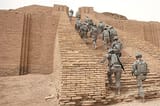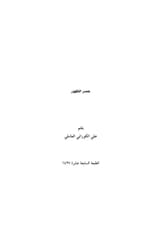Anonymous
7/23/2025, 1:29:29 PM No.24575457
>The House of Wisdom, also known as the Grand Library of Baghdad, was believed to be a major Abbasid-era public academy and intellectual center in Baghdad. In popular reference, it acted as one of the world's largest public libraries during the Islamic Golden Age.
>The House of Wisdom existed as a part of the major Translation Movement taking place during the Abbasid Era, translating works from Greek and Syriac to Arabic.
>The fields to which scholars associated with the House of Wisdom contributed include, but are not limited to, philosophy, mathematics, medicine, astronomy, and optics.
>Inside the House of Wisdom, writers, translators, authors, scientists, scribes, and others would meet daily for translation, writing, conversation, reading, and dialogue.
>On February 13, 1258, the Mongols entered the city of the caliphs, starting a full week of pillage and destruction. Khwaja Muhammad Habeebullah Ansari, prominent scholar from Herat, an advisor of Caliph Al-Musta'sim and his son Ahmad, commander of Baghdad's cavalry and descendant of Abu Ayyub al-Ansari were killed by the pillaging Mongol forces while defending the library with his soldiers.
>Along with all other libraries in Baghdad, the House of Wisdom was destroyed by Hulagu's army during the Siege of Baghdad. The books from Baghdad's libraries were thrown into the Tigris River in such quantities that the river was said to have run black with the ink from their pages.
Can you imagine such a place? It attracted Muslim, Christian, Jewish scholars from all over the world. Writers, scientists, translators.
An intellectual Makkah full of great minds and incredible conversations, a literal house of wisdom filled to the brim with books and manuscripts to study and discuss.
It is often forgotten that civilization itself began in what is now modern Iraq. It is home to the ruins of Ur, the hometown of Abraham. It is home to the oldest libraries in the world.
I trade books with a madrasa student in Iraq, it is mind boggling to consider the intellectual and civilizational history of the region.
>The House of Wisdom existed as a part of the major Translation Movement taking place during the Abbasid Era, translating works from Greek and Syriac to Arabic.
>The fields to which scholars associated with the House of Wisdom contributed include, but are not limited to, philosophy, mathematics, medicine, astronomy, and optics.
>Inside the House of Wisdom, writers, translators, authors, scientists, scribes, and others would meet daily for translation, writing, conversation, reading, and dialogue.
>On February 13, 1258, the Mongols entered the city of the caliphs, starting a full week of pillage and destruction. Khwaja Muhammad Habeebullah Ansari, prominent scholar from Herat, an advisor of Caliph Al-Musta'sim and his son Ahmad, commander of Baghdad's cavalry and descendant of Abu Ayyub al-Ansari were killed by the pillaging Mongol forces while defending the library with his soldiers.
>Along with all other libraries in Baghdad, the House of Wisdom was destroyed by Hulagu's army during the Siege of Baghdad. The books from Baghdad's libraries were thrown into the Tigris River in such quantities that the river was said to have run black with the ink from their pages.
Can you imagine such a place? It attracted Muslim, Christian, Jewish scholars from all over the world. Writers, scientists, translators.
An intellectual Makkah full of great minds and incredible conversations, a literal house of wisdom filled to the brim with books and manuscripts to study and discuss.
It is often forgotten that civilization itself began in what is now modern Iraq. It is home to the ruins of Ur, the hometown of Abraham. It is home to the oldest libraries in the world.
I trade books with a madrasa student in Iraq, it is mind boggling to consider the intellectual and civilizational history of the region.
Replies:



